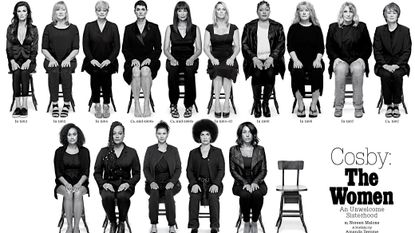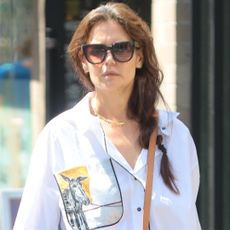

The cover story of New York magazine this week is a chillingly powerful portrait of 35 women who have all accused Bill Cosby of sexual assault. It's a lot to take in—which is exactly the point—and it's been widely discussed in recent days.
But now a new narrative is evolving.
On the cover, after rows of women sitting in chairs, there's one empty chair. It was meant to represent the 11 other known accusers who chose not to participate in the story, but whose experiences are no less valid and still need to be considered.
That chair has now taken on a life of its own. Under the hashtag #TheEmptyChair, thousands of people are speaking out about how many victims of sexual assault feel voiceless, powerless, and unable to come forward. (A gut punch: According to the Rape, Abuse, and Incest National Network, there are about 293,000 sexual assaults a year—and an eye-watering 68% of them go unreported.)
Journalist Elon James White, who publishes This Week in Blackness, was the first to use #TheEmptyChair hashtag, and ended up receiving hundreds of direct messages, emails, and Facebook messages from anonymous women who felt compelled to share their stories of sexual assault. He started sharing those stories on Twitter on Sunday, and he hasn't stopped yet.
The concept is similar to the blog I Believe You | It's Not Your Fault, which posts submitted stories about sexual assault and gives advice to survivors. But with Cosby in the news, it's more important than ever to show how much of a problem rape culture really is.
Powerfully, people have used #TheEmptyChair to give messages of support and love to victims everywhere.
Stay In The Know
Marie Claire email subscribers get intel on fashion and beauty trends, hot-off-the-press celebrity news, and more. Sign up here.
If you are in the #TheEmptyChair - you are not alone, you are not defined by what happened to you. I believe you. I hear you. I stand w/ youJuly 27, 2015
Do not wait for a man to speak to believe women who are already talking. Nothing to add. #TheEmptyChairJuly 27, 2015

Megan Friedman is the former managing editor of the Newsroom at Hearst. She's worked at NBC and Time, and is a graduate of Northwestern's Medill School of Journalism.
-
 Meryl Streep Reveals That Skinnydipping at 5 O'Clock In the Morning Is Something Her ‘Big Little Lies’ Co-Star Nicole Kidman Apparently Enjoys
Meryl Streep Reveals That Skinnydipping at 5 O'Clock In the Morning Is Something Her ‘Big Little Lies’ Co-Star Nicole Kidman Apparently EnjoysStreep presented Kidman with a lifetime achievement award on Saturday, and said it was “impossible not to be in awe of her" (referring more to her work than her early morning dips in the Pacific).
By Rachel Burchfield Published
-
 Katie Holmes Finds the Least Basic White Button-Down
Katie Holmes Finds the Least Basic White Button-DownHers has a playful illustrated twist.
By Halie LeSavage Published
-
 There’s A Poignant Reason Why Prince Harry and Meghan Markle’s Upcoming Visit to Nigeria Will Be Especially Meaningful to Them
There’s A Poignant Reason Why Prince Harry and Meghan Markle’s Upcoming Visit to Nigeria Will Be Especially Meaningful to ThemThe couple will travel there next month, following a stop for Harry in the U.K. to mark the Invictus Games’ 10-year anniversary on May 8.
By Rachel Burchfield Published
-
 30 Female-Friendly Porn Websites for Any Mood
30 Female-Friendly Porn Websites for Any MoodAll the best websites, right this way.
By Kayleigh Roberts Published
-
 The 82 Best Cheap Date Ideas for Couples on a Budget
The 82 Best Cheap Date Ideas for Couples on a Budget"Love don't cost a thing." —J.Lo
By The Editors Last updated
-
 Diary of a Non-Monogamist
Diary of a Non-MonogamistRachel Krantz, author of the new book 'Open,' shares the ups and downs of her journey into the world of open relationships.
By Abigail Pesta Published
-
 COVID Forced My Polyamorous Marriage to Become Monogamous
COVID Forced My Polyamorous Marriage to Become MonogamousFor Melanie LaForce, pandemic-induced social distancing guidelines meant she could no longer see men outside of her marriage. But monogamy didn't just change her relationship with her husband—it changed her relationship with herself.
By Melanie LaForce Published
-
 COVID Uncoupling
COVID UncouplingHow the pandemic has mutated our most personal disunions.
By Gretchen Voss Published
-
 16 At-Home Date Ideas When You're Stuck Indoors
16 At-Home Date Ideas When You're Stuck IndoorsStaying in doesn't have to be boring.
By Katherine J. Igoe Published
-
 Long Distance Relationship Gift Ideas for Couples Who've Made It This Far
Long Distance Relationship Gift Ideas for Couples Who've Made It This FarAlexa, play "A Thousand Miles."
By Jaimie Potters Published
-
 15 Couples on How 2020 Rocked Their Relationship
15 Couples on How 2020 Rocked Their RelationshipCouples confessed to Marie Claire how this year's many multi-stressors tested the limits of their love.
By Sherry Amatenstein, LCSW Published